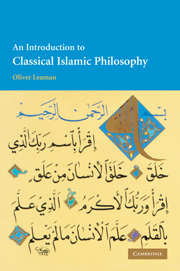Book contents
- Frontmatter
- Contents
- Preface to the first edition
- Preface to the second edition
- List of texts and abbreviations
- Introduction
- PART I AL-GHAZĀLĪ'S ATTACK ON PHILOSOPHY
- 1 How did God create the world?
- 2 Immortality and the active intellect
- 3 Can God know particulars?
- PART II REASON V. REVELATION IN PRACTICAL REASONING
- Further reading
- Glossary
- Index of passages
- General index
2 - Immortality and the active intellect
Published online by Cambridge University Press: 05 June 2012
- Frontmatter
- Contents
- Preface to the first edition
- Preface to the second edition
- List of texts and abbreviations
- Introduction
- PART I AL-GHAZĀLĪ'S ATTACK ON PHILOSOPHY
- 1 How did God create the world?
- 2 Immortality and the active intellect
- 3 Can God know particulars?
- PART II REASON V. REVELATION IN PRACTICAL REASONING
- Further reading
- Glossary
- Index of passages
- General index
Summary
It will be recalled that al-Ghazālī did not think that the philosophers set themselves against Islam merely through their adherence to the doctrine of the eternity of the world. They also
were opposed to all Muslims in their affirming that men's bodies will not be assembled on the Last Day, but only disembodied spirits will be rewarded and punished, and the rewards and punishments will be spiritual, not corporal. They were indeed right in affirming the spiritual rewards and punishments, for these also are certain; but they falsely denied the corporal rewards and punishments and blasphemed the revealed Law in their stated views.
He is quite right in claiming that the philosophers did not accept without severe qualification the idea that God will eventually reconstitute bodies and they will live again in the sense that we will live again. There are difficulties in the Aristotelian account of the soul for the sort of account which orthodox Islam seems to want to provide and yet be acceptable philosophically. The notion of the soul which the falāsifa develop is complex and closely connected with their use of the concept of the active intellect.
The notion of the active intellect in Islamic philosophy stems from what appears to be a casual remark of Aristotle that the intellect is ‘part of the soul’, which at first had no nature other than its potentiality for thinking, but which later could ‘become each thing’ (De An. 429a 21–2; 429b 6).
- Type
- Chapter
- Information
- An Introduction to Classical Islamic Philosophy , pp. 107 - 129Publisher: Cambridge University PressPrint publication year: 2001



